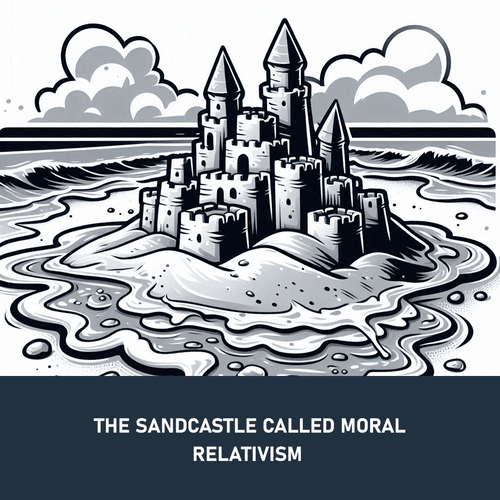The Sandcastle of Moral Relativism: A Christian Perspective
Moral Relativism: A Road to Chaos or A Path to Tolerance?
Moral relativism is a philosophical viewpoint that has gained significant traction in modern society. At its core, it posits moral truths are not absolute—but relative to an individual or a culture’s beliefs and values. Proponents argue that since different societies have diverse moral frameworks, there can be no universal moral standard that applies to all people, in all places, at all times.
The allure of moral relativism lies in its promise of tolerance and respect for cultural diversity. It appears to offer a way to navigate the complexities of a pluralistic world, where imposing one’s moral values on others is seen as a form of oppression or cultural imperialism.
However, from a Christian perspective, the sandcastle of moral relativism presents profound philosophical and practical challenges that strike at the very heart of the faith’s teachings on morality, human dignity, and our shared humanity. Here’s why:
‘Intolerant’ to None, Disrespectful to All: Moral relativism may masquerade as a tolerant and inclusive worldview. However, given its denial of objective moral truth, it is antagonistic to the fundamental beliefs of all major faiths. All faiths have moral absolutes their adherents believe are divinely ordained and universally binding. The notion that moral truths are mere personal preferences or cultural constructs directly contradicts the scriptures and moral codes that form the bedrock of these faiths. By rejecting the existence of objective moral standards, moral relativism dismisses the moral authority of religious teachings, reducing them to mere opinions subject to individual interpretation. This stance is thus inherently disrespectful to all faiths. Ironically, in its pursuit of tolerance, moral relativism ends up being intolerant towards the deeply held convictions of religious communities, undermining the very diversity it claims to celebrate.
The Importance of Objective Moral Truth: Christians believe moral truths are objective, transcendent, and rooted in the unchanging character of God. The Ten Commandments, Jesus’ moral teachings, and the ethical principles outlined in the New Testament are not mere social constructs but divine revelations that reflect the inherent worth and dignity of every human being.
Without an objective moral standard, the Christian worldview loses its foundation, and morality becomes an arbitrary, ever-shifting set of preferences. Moral relativism opens the door to a world where injustice, such as genocide, oppression, and exploitation can be justified as culturally acceptable norms, undermining the universal human rights and dignity that Christianity upholds.
The Problem of Moral Progress: Moral relativism also struggles to account for the concept of moral progress. Throughout history, societies have recognized and rejected immoral practices such as slavery, oppression of women, and child labour, not because cultural norms shifted, but because these practices violated an objective moral standard that transcended any particular culture.
If morality is entirely relative, how can we condemn past atrocities or strive for a more just and ethical world? The Christian perspective acknowledges that while our understanding of moral truths may deepen over time, the moral truths themselves are anchored in the unchanging character of God, providing a stable foundation for moral progress.
The Paradox of Tolerance: Interestingly, moral relativism itself faces a paradox: if all moral beliefs are equally valid, how can it condemn those who reject tolerance? By denying the existence of objective moral truths, moral relativism inadvertently undermines its own call for tolerance, as intolerance itself becomes a morally defensible position.
The Christian Response: From a Christian perspective, the solution to navigating moral diversity lies not in moral relativism but in a principled commitment to objective moral truths rooted in the character of God, coupled with humility, empathy, and a willingness to engage in respectful dialogue.
Rather than imposing moral absolutes through coercion or force, the Christian approach seeks to persuade through reason, love, and a genuine concern for the flourishing of all people. It recognizes that while moral truths are objective, our understanding of them is shaped by culture, tradition, and personal experience.
By upholding the inherent dignity of all people and engaging in respectful discourse, Christians can navigate moral differences while remaining anchored in the immutable moral truths revealed by God. It is a delicate balance, but one that ultimately recognizes our shared humanity and the universal longing for justice, compassion, and ethical coherence.
In a world plagued by moral confusion and ethical relativism, the Christian worldview offers a beacon of hope—a way to affirm universal human dignity while embracing the richness of cultural diversity. It is a call to transcend the shifting sands of moral relativism and anchor our lives in the unshakable foundation of God’s eternal moral character.
The Paradox of Tolerance: A Self-Defeating Philosophy
The sandcastle of moral relativism, the idea that moral truths are subjective and culturally determined, faces a glaring paradox that exposes its own inherent incoherence. If relativism claims all moral beliefs are equally valid, on what basis can it condemn those who reject tolerance itself? By denying the existence of objective moral truths that transcend individual preferences, moral relativism inadvertently undermines its own rallying cry for tolerance.
After all, if morality is purely a matter of personal opinion or cultural norms, intolerance becomes just as defensible as tolerance. An intolerant person or society could simply assert his moral code sanctions discrimination, oppression, or even violence against others. Without an objective moral foundation, relativism has no compelling justification to declare such intolerant views as ethically inferior or invalid.
This paradox reveals the self-defeating nature of moral relativism. In its quest to be maximally inclusive of all perspectives, it ends up embracing a framework in which the most reprehensible ethical stances cannot be authoritatively condemned. Tolerance itself becomes an arbitrary preference rather than a universal moral imperative.
Ultimately, the paradox exposes moral relativism’s inability to ground human rights, human dignity, and core ethical values in any objective reality. It reduces morality to a matter of mere opinion, leaving us adrift in a sea of competing subjective preferences with no objective means of adjudication. As such, moral relativism fails to provide a coherent and defensible ethical system capable of navigating the complexities of human society and experience.
Related Reads
Editor's Pick

Did Jesus Cleanse the Temple Twice?
OR DID JOHN DISAGREE WITH THE SYNOPTICS ON TIMING? One of sceptics’ favourite "gotcha" questions targets what they see as [...]

Self-Authentication: Why Scripture Doesn’t Need External Validation
"How can the Bible prove itself? Isn't that circular reasoning?" This objection echoes through university classrooms, coffee shop discussions, and [...]

Do Christians Need Holy Shrines? Why the Reformed Answer Is No
Walk into a medieval cathedral and you'll encounter ornate shrines, gilded reliquaries, and designated "holy places" where pilgrims gather to [...]

I Want To Believe, But Can’t: What Do I Do?
"I want to believe in God. I really do. But I just can't seem to make it happen. I've tried [...]

BC 1446 or 1250: When Did the Exodus Really Happen?
WHY REFORMED SCHOLARS SUPPORT THE EARLY DATE Many a critic makes the claim: “Archaeology has disproven the biblical account [...]

Does God Know the Future? All of It, Perfectly?
Think about this: our prayers tell on us. Every time we ask God for something, we’re confessing—often without realising it—what [...]

Can Christian Couples Choose Permanent Birth Control?
Consider Sarah, whose fourth pregnancy nearly killed her due to severe pre-eclampsia, leaving her hospitalised for months. Or David and [...]

Bone of My Bones: Why Eve Was Created From Adam’s Body
"This at last is bone of my bones and flesh of my flesh!" Adam's joyful exclamation upon first seeing Eve [...]

Is Calvinism Fatalism in Christian Disguise? Think Again
We hear the taunt every now and then: "Calvinism is just fatalism dressed up in Christian jargon." Critics argue Reformed [...]

Can Churches Conduct Same-Sex Weddings?
In an era of rapid cultural change, churches across America face mounting pressure to redefine their understanding of marriage. As [...]
SUPPORT US:
Feel the Holy Spirit's gentle nudge to partner with us?
Donate Online:
Account Name: TRUTHS TO DIE FOR FOUNDATION
Account Number: 10243565459
Bank IFSC: IDFB0043391
Bank Name: IDFC FIRST BANK






